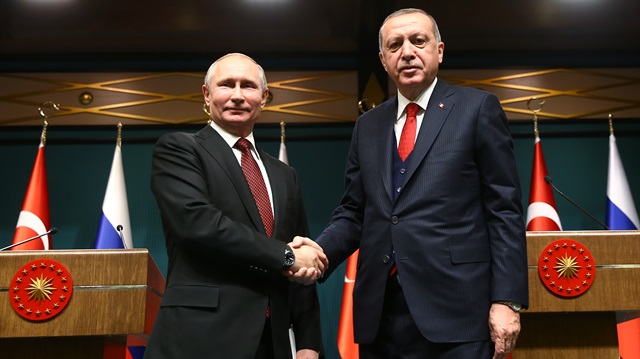
Russian foreign policy expert Yury Barmin says ties between Turkey and Russia have grown stronger over time, and are due to be further strengthened
Yury Barmin evaluated Turkey-Russia relations in an exclusive interview with Yeni Şafak daily. Barmin is an analyst of Russia’s foreign policy in the Middle East and a MENA expert at the Russian International Affairs Council. Barmin believes that Turkey and Russia will boost trade and military cooperation, and that the political game played by the West is driving Ankara and Mosclow closer together.
Ties between Turkey and Russia soured after a Russian jet was downed in 2015 but have recently been improving. In December last year, Turkey and Russia signed an accord for Moscow to supply Ankara with S-400 surface-to-air missile batteries, finalizing a deal set to deepen military ties between NATO member Turkey and the Kremlin.
There is a number of outstanding issues in bilateral relations ranging from sluggish trade, visas for Turkish citizens and problems with the implementation of the TurkStream pipeline project to Russia's doubts about Ankara's intentions in northern Syria. So the time was right for the two presidents to meet and talk these things over. The fact that Putin paid his first visit to Turkey after being reelected is a sign of the times. Moscow is of course making a statement that it is now focusing on developing a stronger relationship with the East and puts it ahead of the West.

The strongest feature of this relationship is trade which was hurt by the temporary break in ties. Trade in agricultural goods, clothing, and machinery still needs to be improved. Barriers need to be removed. Russia is looking to work more with Turkish construction companies as well.
I don't think that Russia's relations with the West or the lack thereof will in any way affect its ties with Turkey. In fact I see more convergence between Moscow and Ankara than between Ankara and the West. Turkey's NATO membership is of course worrying to the Russians regarding its implications in the military domain, but I have a sense that Ankara is willing to allay Putin's fears in that respect, which is why Russia-Turkey cooperation in Syria has been boosted. Turkey did not take a stance on issues related to recent crises in Russia-West relations, such as the alleged poisoning case, which Russia appreciates of course.
Russia's increased military presence in Syria, including its military bases there, mean that the two countries will have to find new ways of coordination in the Eastern Mediterranean for example. Moscow has also been advocating the idea of creating a regional collective security system that would include Arabs, Iranians, Israelis and Turks, but this idea is likely to face much push-back for the time being.
There is a certain chemistry between the two leaders, this is what helps the relationship between the two countries. The crisis in their ties two years ago has been a bitter episode, but it seems that it led both leaders to realize that their relations really matter, something that Russia doesn't have with any other country in the Middle East. So I believe that short crisis made relations between Putin and Erdoğan much stronger. Besides, both of them feel that the West is playing an elaborate political game against them, another factor driving them closer to each other.

From Russia's perspective this decision is easy to explain. Moscow fears that Ankara may still purchase Patriot missiles from the U.S. given recent statements from Ankara, so it is looking to deliver the S-400s earlier. Russia looks at Turkey for long-term military-technical cooperation. Putin said yesterday that Moscow wants to supply other weapons systems to Turkey as well. The S-400 in this context is a good start for this cooperation.



